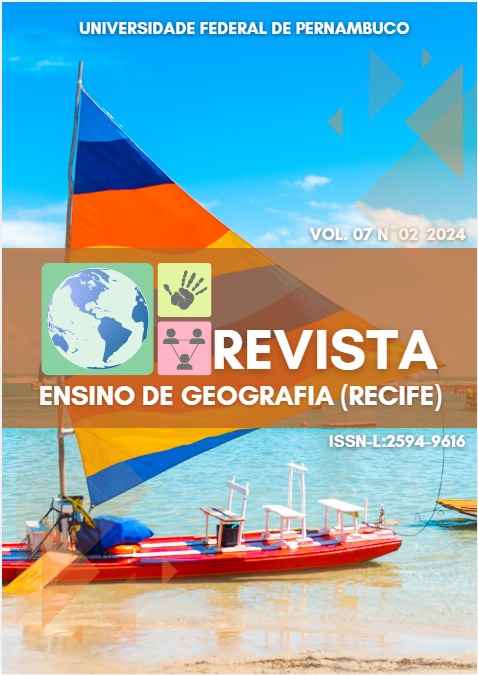Geotechnologies in geography teaching: a look from gamification
DOI:
https://doi.org/10.51359/2594-9616.2024.263366Keywords:
educational technologies, teaching-learning, reflective-training workshopsAbstract
Education is fundamental to the socioeconomic development of a society, being essential for sociocultural, political and economic progress. Investing in the training of human resources, especially in the educational field, is crucial to meet the growing demands of planning, management, teaching and learning. Teachers play a central role in this process, standing out as protagonists in improving the quality of teaching, making it vital to invest in their professional development. With changes in the world of work, teachers need to acquire skills and competencies to build new knowledge. Continuous training for teachers, especially in technology, is essential to face these challenges. The use of Digital Technologies in education, including digital networks, has been widely discussed, providing new forms of interaction and learning. Research is proposed to investigate how digital technologies, especially geotechnologies, can contribute to the teaching of Geography in basic education. The qualitative methodology will be adopted, involving both pre-service and in-service teachers. The study will be carried out in four stages: bibliographic review, online content analysis, reflective workshops and data processing, aiming to improve educational practices and promote more meaningful and interdisciplinary learning. This study seeks not only to understand the role of digital technologies in Geography teaching, but also to provide support for the development of more effective educational policies and practices, preparing students for contemporary and future society.
References
ALMEIDA, M. E. B. Apresentação. In. BACICH, L. e MORAN, J. Metodologias ativas para uma educação inovadora: uma abordagem téorico-prática. Porto Alegra, Penso, 2018 p. 9-13.
BANHARA, Geraldo Donizete. A utilização das novas tecnologias no ensino de geografia. 2014.
BRASIL, Lei de Diretrizes e Bases da Educação Nacional. Lei nº 9.394/06, de 20 de dezembro de 1996.
CALLAI, Helena Copetti. A formação do professor de Geografia. Boletim Gaúcho de Geografia, v. 20, n. 1, 1995.
CARNEIRO, Eduardo Lorini; BACKES, Luciana. Gamificação como prática pedagógica na disciplina de geografia. 2021.
CASTELLS, Manuel. A galáxia da internet: reflexões sobre a internet, os negócios e a sociedade; tradução Maria Luiza X de A. Borges, Rio de Janeiro: Jorge Zahar, 2003.
DA SILVA MOURA, Hélio Maria. O uso das tecnologias no ensino de geografia. Estudos Avançados Sobre Saúde e Natureza, v. 2, 2022.
DA SILVA, João Eupídio Monteiro; DE CARVALHO, Edione Teixeira. Gamificação e redes neurais artificiais como contribuição ao ensino de geografia no pós pandemia: uma revisão da literatura. Cuadernos de Educación y Desarrollo, v. 16, n. 3, p. e3725-e3725, 2024.
DE ALENCAR, Anderson Fernandes. O pensamento de Paulo Freire sobre a tecnologia: traçando novas perspectivas. 2005.
FITZ, Paulo Roberto. Geoprocessamento sem complicação. Oficina de textos, 2018.
INOCÊNCIO, Doralice; CAVALCANTI, Carolina Magalhaes Costa. O papel do professor como mediador do processo de ensino-aprendizagem em ambientes on-line. Cadernos de Psicopedagogia, v. 6, n. 11, p. 00-00, 2007.
KARSENTI, Thierry. Impacto das TIC (Tecnologias de Informação e Comunicação) sobre a atitude, a motivação, a mudança nas práticas pedagógicas dos futuros professores. In: TARDIF, M.;
KENSKI, V. M. Educação e tecnologias: o novo ritmo da informação. 3. ed. Campinas, SP: Papirus, 2007.
LEMOS, André. Ciberespaço e tecnologias móveis: processos de territorialização e desterritorialização na cibercultura. Imagem, visibilidade e cultura midiática. Livro da XV COMPÓS. Porto Alegre: Sulina, p. 277-293, 2007.
LÉVY, P. A Máquina Universo – Criação, cognição e cultura informática. Porto Alegre: Artmed, 1999.
LÉVY, P. Cibercultura. São Paulo, Editora 34, 1999.
MARCHEZINI, Victor et al. Geotecnologias para prevenção de riscos de desastres: usos e potencialidades dos mapeamentos participativos. Rev Brasileira Cartog, v. 69, n. 1, p. 107-128, 2017.
MORAES, F. D. de. Ciberespaço entre as redes e o espaço geográfico: algumas considerações teóricas. Revista Caminhos de Geografia Uberlândia, v. 14, n. 47 Set/2013 p. 139–149.
MORAN, José Manuel; MASETTO, Marcos T. e BEHRENS, Marilda Aparecida. Novas tecnologias e mediação pedagógica. Campinas: Papirus, 2000.
OLIVEIRA, Maria Auxiliadora Monteiro (org.). Novas linguagens e novas tecnologias: Educação e sociabilidade. Petrópolis: Vozes, 2004
RAMAL, Andréa Cecília. Educação na Cibercultura – Hipertextualidade, Leitura, Escrita e Aprendizagem. Porto Alegre: Artmed, 2002.
RAMOS, J. L. Avaliação e Qualidade de Recursos Educacionais Digitais. Cadernos SACAUSEF V, Ministério da Educação, 2009.
SAID, Gustavo Fortes. Mídia, poder e história na era pós-moderna. Teresina: Edufpi, 1998.
SAUER, Carl O. The education of a geographer. ANNALS of the Association of American Geographers, v. 46, n. 3, p. 287-299, 1956.
TOZONI-REIS, Marília Freitas. Metodologia da pesquisa. 2008.
ZANELLA, Liane Carly Hermes et al. Metodologia da pesquisa. SEAD/UFSC, 2006.
Downloads
Published
How to Cite
Issue
Section
License
Copyright (c) 2024 Ronaldo Antönio Ramos Filho, Francisco Kennedy Silva dos Santos

This work is licensed under a Creative Commons Attribution 4.0 International License.
Authors who publish with this journal agree to the following terms:- Authors retain copyright and grant the REVISTA ENSINO DE GEOGRAFIA (RECIFE) right of first publication with the work simultaneously licensed under a Creative Commons Attribution NonCommercial International 4.0 (CC BY-NC) that allows others to share the work with an acknowledgement of the work's authorship and initial publication in this journal.
- Authors are able to enter into separate, additional contractual arrangements for the non-exclusive distribution of the journal's published version of the work (e.g., post it to an institutional repository or publish it in a book), with an acknowledgement of its initial publication in this journal.
- Authors are permitted and encouraged to post their work online (e.g., in institutional repositories or on their website) prior to and during the submission process, as it can lead to productive exchanges, as well as earlier and greater citation of published work.



